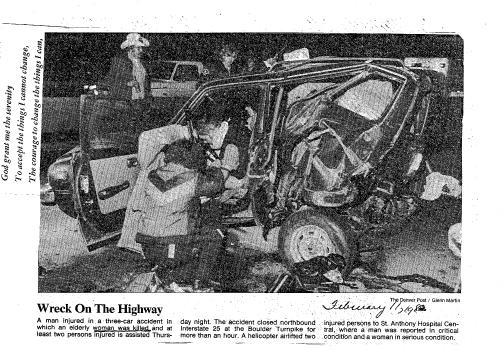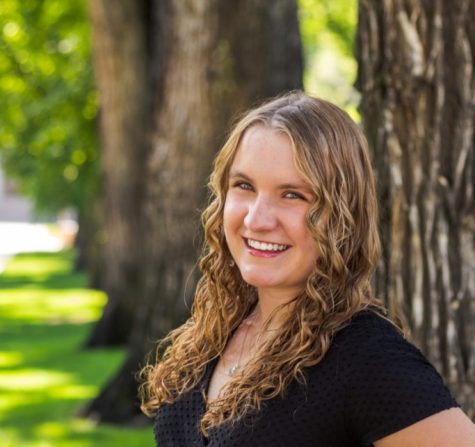Editors Note: One of the sources in this story, Tuesday Black, is a distant cousin of reporter Kailey Pickering.
When mixed with a feeling of invincibility, alcohol can do dangerous things behind the wheel of a car.
In 2015, Jordin Martinez’s life was changed forever when his family became victims of a fatal car crash caused by a drunk driver. In seconds, Martinez’s siblings and father were taken away from him. After the accident, Martinez was touched by the non-profit organization, Mothers Against Drunk Driving (MADD), who strives to stop drunk driving and support victims.
Martinez now shares his story through MADD Victim Impact Panels where DUI offenders are required to listen in as part of their sentencing. Martinez describes how “it’s just cool because once you tell your story, that actually affects people. And it’s cool too, I usually stay around towards the end and at the end of it, everybody’s coming up and saying that it really hit home.” Martinez now feels that he is playing a role in making a change in drunk driving.

While MADD’s Victim Impact Panels hold power in the ways they share experiences of those directly affected by drunk driving experiences, MADD also has many other programs to help victims and raise awareness about drunk driving.
MADD was founded in 1980 by Candy Lightner in California. The organization strives to end drunk driving through raising awareness, in addition to providing support for victims. While the organization has existed nationwide since 1980, its impact did not significantly reach Colorado until 1983 when Barbara Brodt decided to take a stand after her mother died in a drunk driving crash in 1982. Brodt researched the chapter in Colorado Springs at the time and worked to expand the cause across Colorado. She furthered the organization upon her faith and passion. Brodt remembers God speaking to her before she started her work: “he says, ‘If you will trust me, and you will have a good attitude, let’s start MADD in Denver.’”

As a volunteer for 36 years, Brodt has led MADD to implement new programs and pass laws that affect the judicial part of taking action against drinking and driving. She has done it with a passion for what she stands for and looks for the same passion in those she works with.
“When people want to volunteer, I say, ‘But you have to have the heart, you have to get the passion in your heart,”’ says Brodt. “Because what we’re here for is to help victims and survivors.”
While great changes have been implemented, there are still high death rates from driving under the influence. According to the CDC, “10,497 people died in alcohol- impaired driving crashes, accounting for 28% of all traffic-related deaths in the United States.” Based on the Colorado Task Force on Drunk and Impaired Driving’s 2017 annual report, out of 558 fatal crashes in 2016, 161 had a blood alcohol concentration level of .08 or above. In Colorado it is illegal to drive with a BAC of 0.05 or higher. If one has a BAC of 0.05 or higher, they are classified as a DWAI, or Driving While Ability Impaired. This is different from a DUI, or Driving Under the Influence, which is classified when one is driving with a BAC of 0.08 or higher.
While MADD has been making an impact on the fight against drunk driving, the deaths from drunk drivers still remain high, pushing MADD to continue their efforts in preventing drunk driving.

The fight against drunk driving not only dwells in getting the word out about the issue, but also in holding offenders accountable for their actions. Brodt remembers sitting in on the court case of the DUI offender involved in her mother’s crash; she watched as he received only one year of work release. Since then, MADD has established a court monitoring program meant to make sure DUI offenders are held accountable for their crimes.
Tuesday Black began working for MADD in 2018 when the organization implemented the Court Monitoring Program. This program involves volunteers observing and collecting data from court hearings. Black explains that by focusing on first and second time DUI offenders, they make sure they are held accountable. The goal is not only to hold the judicial system accountable but also to provide the public with information about DUI cases. Black says the program serves those who want to learn about this problem: “The more education we can provide them, I think the more we’re going to decrease the odds of them engaging in this type of behavior.”
The program is two years into the three year time span it will take to collect data on the court outcomes. According to Brodt, MADD had a court monitoring system in the past consisting of all volunteers. Because the program consisted of mainly volunteers, participants had other commitments and the program wasn’t able to reach its full potential. In 2018, MADD received a grant to start a monitoring program with employees like Black who are devoted full time to court monitoring.
On October 1, 2020, MADD implemented a court monitoring program in Larimer county. The goal is for the program to be initiated in all 64 counties and 22 judicial districts in Colorado. The program is looking for volunteers who are interested in contributing 6-9 hours a week in court Zoom calls to help the foundation, and gain experience in the criminal justice system.
Between Victim Impact Panels sharing victims’ experiences and the Court Monitoring program holding DUI offenders accountable, MADD also creates space to educate and raise funds through fundraisers.
MADD holds annual events such as the Walk Like MADD event that raises awareness through a walk-a-thon and a Law Enforcement Appreciation Banquet held to honor police officers who contribute to the fight against drunk driving.
Jeff Trujillo manages fundraising and special events for MADD and holds a passion for the Tie One On for Safety event held in December. This event has two components, the first is where local law enforcement will donate a patrol car for the weekend and tie a scarlet ribbon on it to raise awareness about drinking and driving. The second part is where MADD holds a breakfast where lawmakers, representatives of different organizations, public supporters, and victims are all invited. During this breakfast, a victim is given the opportunity to speak about how law enforcement has made a difference in their lives. Victims present nominations for awards to those who have impacted their lives. These nominations can include law enforcement or Trujillo described how one person nominated “the ambulance that showed up on scene, They took really good care of their person and, unfortunately, it was a crash where the person was a 19-year-old boy and he passed away as a result of the crash. But they nominated the first responder because that person was there on scene, was the last person that was there with their son and held him while he died.”

The event honors those who have supported victims of drunk driving while also raising funds for the organization in a unique, light hearted way. Every year Trujillo brightens the atmosphere of the event by making a hat for the breakfast. The table that raises the most money receives this one of a kind, crazy hat. This is an aspect of the event that Trujillo explains guests look forward to: “And so each one of them is coming back year after year and they wear their hats. And so it’s kind of fun to look into the crowd and see these really gaudy hats.”
Fundraisers like these have been able to bring together those impacted by tragic losses ensued by drunk driving while honoring those who devote time to directly helping victims.
MADD’s organization stretches its impact into the lives of the victims of tragic collisions, the courts where the offenders face justice, and the education of the topic to the public. While MADD spreads its resources to impact many, the fight against drunk driving continues when people continue to get behind the wheel intoxicated. The occurrence of these accidents emphasize the importance of MADD and their programs that spread awareness and help those impacted by drunk driving accidents.
If you’re interested in the MADD’s Court Monitoring Program Tuesday Black can be reached at Tuesday.Black@madd.org. You can also visit their website madd.org
College Avenue contributor Kailey Pickering can be reached at collegeavenue@collegian.com or on Twitter @collegeavemag.

































